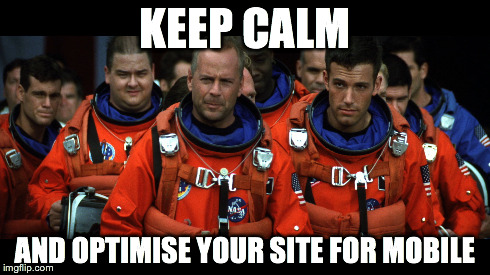Fire, Brimstone, and Mobilegeddon
May 04, 2015
On April 21, Google began to change its algorithm for mobile searches. Websites which aren’t mobile-friendly (big buttons, uncluttered text) were penalized, dropping in rankings of searches done on mobile devices. Google constantly tweaks its search algorithm to make sure the most relevant content shows up on top.
Google released a guide detailing exactly what it’s looking for in terms of mobile-friendliness. And unlike with previous algorithm tweaks, Google let users and developers know months ahead of time about the change and promised a slow rollout, so as to avoid dramatic overnight changes. But this change still caught the public’s attention. (Unless you’ve never heard of this before, in which case it at least caught Matt Drudge’s attention, and the attention of all of these lovely people on Twitter.)
“Small Businesses, Brace Yourselves: Google’s Mobilegeddon Is Upon Us.”
“‘Mobilegeddon’ could be bad news for 40% of top websites.”
“Google’s ‘Mobilegeddon’ Threatens Online Businesses.”
“What is “Mobilegeddon” and Should You Be Worried?”
“Google’s ‘phone friendly’ #mobilegeddon causes SEO mass HYSTERIA.”
(Supply Clinic, for those wondering, has been mobile-friendly since Day 1.)
Needless to say, the actual effects didn’t quite live up to the hype. The algorithm tweak applied only to smartphone searches, so even tablets remained unaffected. Even smartphone searches didn’t change all that dramatically, as demonstrated by the chart below, provided by Moz.

The change, while billed as a threat to small businesses, may actually be a bigger threat to large, established companies that don’t bother to maintain websites that follow best practices. PR agencies, advertising shops, hospitals, and government agencies seem to be some of the biggest losers, thanks to their older websites. But those changes, at least so far, have been relatively slight.
As far as I can tell, the most distressing thing about this whole Mobilegeddon business is the name. After names like “Panda” and “Penguin,” you can understand my disappointment to learn that the next major algorithm tweak isn’t something like “Platypus” or “Porcupine.” What’s their new slogan going to be? “Pmobilegeddon. The P is silent.” It just doesn’t have the same ring as, say, “Pachyderm.” Maybe I’m overthinking it, though. Or maybe a better name will come along and be retroactively applied to this change.
As a consumer, I think this change is probably overdue. I hate pulling out my phone and stumbling upon a website that I can’t use because the buttons somehow migrated off the screen. I can’t stand zooming in and still not being able to read the text, and I’m occasionally tempted to write a strongly-worded letter to someone, usually my congressman, when I click on a website on my phone but can’t see anything because a pop-up ad covers the screen, and the little X button is nowhere to be found.
Now, if Google has any say in the matter, I won’t come across those sites as often. Hopefully more and more companies make their sites responsive to different screen sizes, and Google traffic-driven sites use more optimized ads. Because my congressman is getting really tired of those letters.
--Jacob

Ready to save with Supply Clinic?
Start Shopping!